|
|
|
Sort Order |
|
|
|
Items / Page
|
|
|
|
|
|
|
| Srl | Item |
| 1 |
ID:
082837
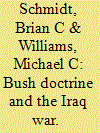

|
|
|
|
|
| Publication |
2008.
|
| Summary/Abstract |
The aim of this article is to contribute to our understanding of both the debate over the war in Iraq and its implications for the future of U.S. foreign policy by examining the relationship between neoconservatism and realism. The article begins by establishing the connection between the tenets of neoconservatism and the arguments for war against Iraq. The primary focus is on the neoconservative Bush Doctrine that served as the primary justification for the Iraq War. Next, we turn to the arguments that realists put forth in their attempt to steer America away from the road to war. The realists, however, proved to be unsuccessful in their attempt to prevent war and in the final section we address the central question of the article; why did realism fail in the debate over Iraq?
|
|
|
|
|
|
|
|
|
|
|
|
|
|
|
|
| 2 |
ID:
075155


|
|
|
|
|
| Publication |
London, Routledge, 2007.
|
| Description |
xii, 172p.
|
| Standard Number |
0415333979
|
|
|
|
|
|
|
|
|
|
|
|
Copies: C:1/I:0,R:0,Q:0
Circulation
| Accession# | Call# | Current Location | Status | Policy | Location |
| 051968 | 355.033/WIL 051968 | Main | On Shelf | General | |
|
|
|
|
| 3 |
ID:
163287
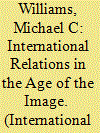

|
|
|
|
|
| Summary/Abstract |
Images pervade contemporary politics. Across the globe, people receive more and more of their information and impressions about politics through media outlets saturated with images, while political leaders show increasing skill in melding popular culture and political power. Understanding the aesthetic dimensions of world politics is thus of paramount importance. This article seeks to deepen our understanding of the historical and political relationship between images and international theory. Contrary to the predominant view, it argues that, far from being absent from international relations (IR), aesthetics concerns were at the heart of the intellectual politics in which the postwar study of international relations developed. The article shows that suspicion toward aesthetics in IR is not simply the result of ignorance about emotions or images in politics, nor of methodological myopia. Instead its roots are political and lie in the powerful political constellation of Cold War liberalism, social science, and the foreign policy strategies and political struggles of the Cold War. This history has largely disappeared from the self-understanding of the field, but its recovery is essential in appreciating the place of aesthetics in international relations theory and addressing the challenges posed by aesthetics in contemporary world politics.
|
|
|
|
|
|
|
|
|
|
|
|
|
|
|
|
| 4 |
ID:
116131
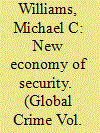

|
|
|
|
|
| Publication |
2012.
|
| Summary/Abstract |
New security dynamics present significant theoretical and empirical challenges. This article suggests that Pierre Bourdieu's ideas about an 'economics of practice' provides a fruitful means for exploring and explaining many of these transformations.
|
|
|
|
|
|
|
|
|
|
|
|
|
|
|
|
| 5 |
ID:
101480


|
|
|
|
|
| Publication |
2010.
|
| Summary/Abstract |
This article suggests adding the category of public/private to Buzan & Hansen's (2009) account of the four central themes structuring security studies. By doing so, we can illuminate key parts of the field's analytic and political development, and better appreciate the challenges that it confronts in analysing new phenomena, including transnational non-state violence and security privatization.
|
|
|
|
|
|
|
|
|
|
|
|
|
|
|
|
| 6 |
ID:
179324
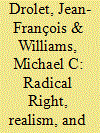

|
|
|
|
|
| Summary/Abstract |
The rise of the radical Right over the last decade has created a situation that demands engagement with the intellectual origins, achievements, and changing worldviews of radical conservative forces. Yet, conservative thought seems to have no distinct place in the theoretical field that has structured debates within the discipline of IR since 1945. This article seeks to explain some of the reasons for this absence. In the first part, we argue that there was in fact a clear strand of radical conservative thought in the early years of the field's development and recover some of these forgotten positions. In the second part, we argue that the near disappearance of those ideas can be traced in part to a process of ‘conceptual innovation’ through which postwar realist thinkers sought to craft a ‘conservative liberalism’ that defined the emerging field's theoretical alternatives in ways that excluded radical right-wing positions. Recovering this history challenges some of IR's most enduring narratives about its development, identity, and commitments – particularly the continuing tendency to find its origins in a defining battle between realism and liberalism. It also draws attention to overlooked resources to reflect upon the challenge of the radical Right in contemporary world politics.
|
|
|
|
|
|
|
|
|
|
|
|
|
|
|
|
| 7 |
ID:
077392
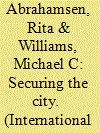

|
|
|
|
|
| Publication |
2007.
|
| Summary/Abstract |
The past decade has witnessed a remarkable expansion and globalisation of the private security sector. These developments mark the emergence of public-private, global-local security networks that play increasingly important roles in global governance. Rather than representing a simple retreat of the state, security privatisation is a part of broad processes in which the role of the state - and the nature and locus of authority - is being transformed and rearticulated. Often presented as apolitical, as the mere effect of market forces and moves towards greater efficiency in service delivery, the authority conferred on private actors can alter the political landscape and in the case of private security has clear implications for who is secured and how. The operation and impact of public/private, global/local security networks is explored in the context of security provision in Cape Town, South Africa.
|
|
|
|
|
|
|
|
|
|
|
|
|
|
|
|
| 8 |
ID:
109596
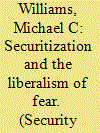

|
|
|
|
|
| Publication |
2011.
|
| Summary/Abstract |
This article seeks to extend securitization theory conceptually and, to a lesser degree, empirically by further developing the relationship between securitization and the politics of fear. Drawing on Shklar's notion of the liberalism of fear, it argues that instead of looking at the ways in which fear can facilitate processes of securitization and the extension of security logics throughout society, the liberalism of fear allows us to see how fear can operate in ways that can actually inhibit processes of securitization. This strategy might accurately be termed 'the securitization of securitization', and the liberalism of fear calls attention to how the fear of fear can in a specific sense be seen as a desecuritizing resource - a countervailing logic against processes of intensification within both 'normal' and 'security' politics.
|
|
|
|
|
|
|
|
|
|
|
|
|
|
|
|
| 9 |
ID:
138086
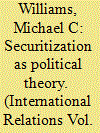

|
|
|
|
|
| Summary/Abstract |
One of the great appeals of securitization theory, and a major reason for its success, has been its usefulness as a tool for empirical research: an analytic framework capable of practical application. However, the development of securitization has raised several criticisms, the most important of which concern the nature of securitization theory. In fact, the appropriate methods, the research puzzles and type of evidence accepted all derive to a great extent from the kind of theory scholars bequeath their faith to. This Forum addresses the following questions: What type of theory (if any) is securitization? How many kinds of theories of securitization do we have? How can the differences between theories of securitization be drawn? What is the status of exceptionalism within securitization theories, and what difference does it make to their understandings of the relationship between security and politics? Finally, if securitization commands that leaders act now before it is too late, what status has temporality therein? Is temporality enabling securitization to absorb risk analysis or does it expose its inherent theoretical limits?
|
|
|
|
|
|
|
|
|
|
|
|
|
|
|
|
| 10 |
ID:
087311
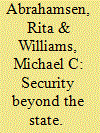

|
|
|
|
|
| Publication |
2009.
|
| Summary/Abstract |
To date, most discussion of security privatization in international politics has been focused on the role of private military companies and mercenaries. This article seeks to shift the focus away from the battlefields and toward the less spectacular privatization and globalization of commercial private security. Drawing on Saskia Sassen's notion of state "disassembly," we situate the growth of private security within broader shifts in global governance. Pointing to the weakness of seeing the rise of private security as an erosion of state power and authority, we show instead a re-articulation of the public/private and global/local distinctions and relationships into what we term "global security assemblages." Analyzing the role of private security in two such assemblages in Sierra Leone and Nigeria, we show how a range of different security agents and normativities interact, cooperate and compete, to produce new institutions, practices and forms of security governance. Global security assemblages thus mark important developments in the relationship between security and the sovereign state, structures of political power and authority, and the operations of global capital.
|
|
|
|
|
|
|
|
|
|
|
|
|
|
|
|
| 11 |
ID:
138343
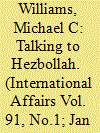

|
|
|
|
|
| Summary/Abstract |
The two studies under review, by Matthew Levitt and Lina Khatib et al., present very different pictures of Hezbollah, pictures which are not necessarily conflicting and are indeed, in many ways, complementary. Levitt focuses on the group's long record of terrorism dating back more than 30 years to the early 1980s and its violent attacks on US marines and French forces then based in Lebanon. Over that period, of course, as Lina Khatib and her co-authors demonstrate, Hezbollah has grown in stature as a political party. Khatib and her colleagues portray a party that has deliberately sought to keep Lebanon a weak and divided country, despite the efforts of the West and Gulf Arab states to strengthen the Lebanese state. These two studies add immensely to our knowledge of Hezbollah and its extraordinary rise over the past three decades to become one of the major political and military actors in the Middle East.
|
|
|
|
|
|
|
|
|
|
|
|
|
|
|
|
| 12 |
ID:
092034
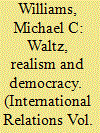

|
|
|
|
|
| Publication |
2009.
|
| Summary/Abstract |
Waltz is generally seen as one the most important advocates of a systemic theory of international politics that stresses the importance of international anarchy and marginalizes domestic politics. Locating Waltz's thinking against debates within realism in the 1950s, and drawing especially on his neglected Foreign Policy and Democratic Politics, this article argues that Waltz's thinking actually contains powerful domestic political dimensions that centre on a defence of democratic foreign policymaking. Rather than marginalizing domestic politics, Waltz's theory - and his critique of classical realism - is in part actually a subtle intervention in domestic politics.
|
|
|
|
|
|
|
|
|
|
|
|
|
|
|
|
| 13 |
ID:
066279
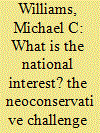

|
|
|
| 14 |
ID:
062272
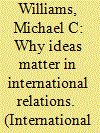

|
|
|
|
|
|
|
|